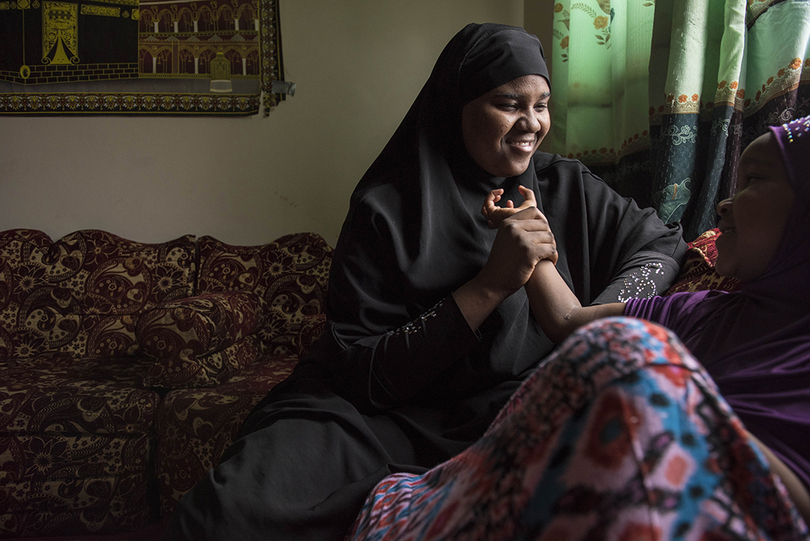Deynaba Farah: Senior uses Muslim faith to influence positive change in Syracuse community

Deynaba Farah was born in Somalia and spent her childhood in Kenya until her family was "posted" and registered through the United Nations for their move to Georgia. While she intends to return to her native country, she has become a driving force in the Syracuse community. Frankie Prijatel | Senior Staff Photographer
When Deynaba Farah was 15 years old, she had trouble falling asleep at night. As she drifted to sleep in her bedroom, filled with Syracuse basketball memorabilia and an overflowing bookshelf filled with novels like “The Mis-Education of the Negro” and “Malcolm X,” she stared out her window and focused on a bright red light blinking in the distance.
That light stands on the roof of Day Hall, and Farah stared at this symbol of her dream of attending Syracuse University every single day throughout high school. She would be the first person in her family to even think about attending an institution of higher education — or go to school at all — because they came as refugees from Somalia. But as a transfer from Onondaga Community College’s 2+2 program her junior year, she finally made it to the Hill.
Although the 22-year-old senior social work major takes pride in her studies at SU, Farah uses her education to help further her work off campus. As president of the youth group of the Islamic Society of Central New York on Comstock Avenue, she volunteers and sits on the board of the Rahma Health Clinic, is on the board of Alliances of Communities Transforming Syracuse and trains their youth activity council, has an internship at Dr. King Elementary School helping in school social work, runs a Saturday tutoring program for Refugee and Immigrant Self-Empowerment and, on the weekends, hosts a school for children in her neighborhood to teach them about the Quran and the Muslim faith.
Farah doesn’t have much time for herself, but that’s the way she likes it.

“I’ll never have this time again. I’m using the time that I have — my youth — to make my community better to leave a legacy for my children and for the youth that are coming after me so they know what to follow,” she said. “The concept that I’ll never have this time again comes from my religion. … I want all children of African descent to feel that they do have a place in this community.
“They do belong — they just have to find where they belong.”
Farah was born in the Shabelle tribe by the Shabelle River in Somalia, but when she was around a year old, her family was forced out of their farmland. Her mother, Maey, and her father, Osman, spent many months walking to Kenya. The couple raised their family there for six years until they were “posted” and registered with the United Nations to move to Savannah, Georgia, in 2004.
“I’d like to go back one day to my roots, but Syracuse is the place for us,” Farah said. “It was meant to be. I was able to go to school here and become a part of the community in advocacy and activism, and grow as an adult. That was the purpose of Syracuse.”

A large part in helping grow and impact her community starts with the children. Every Saturday and Sunday for two hours Farah teaches kids ages 3 to 17 about the Quran and the reasoning behind the Muslim faith. Last Saturday, the group learned how to pray with the help of repetitive poetry.
Seventeen children dressed in bright pinks, yellows and reds stood in lines of three in the middle of Farah’s living room shouting back proper pronunciation of Arabic words and prayer sequences. Farah walked around to different small groups later in the session correcting their work and keeping an eye on the younger children. Qylah Ellis, Farah’s weekend Quran instructor, said she acts like an older sister when teaching these kids, but they respect her.
“She’s very disciplined and caring,” Ellis said. “She makes sure that they really are learning and goes above and beyond to make sure everyone is where they’re supposed to be. She’s an encouragement and an example.”
Farah takes the same attitude with her to a Saturday morning tutoring program she created for Refugee and Immigrant Self-Empowerment in 2015. Every week at 9 a.m. about 50 to 70 kids varying in levels from kindergarten to high school trickle into the Dr. King Elementary School. For two hours, volunteers — many from the Syracuse University’s Phi Sigma Pi chapter— offer homework help, mentoring sessions and educational group activities for the students.
She contributes her time to enhance her community and strengthen her faith. Farah takes pride in religion and said living in America made her explore her identity as a Muslim-Somali woman more than if she were living back in her war-torn home. In the future, Farah would like to open a social work practice that caters to Muslim families, couples and individuals. She wants to counsel them through their problems within the scope of their religion, which isn’t offered in the Syracuse area.
“Without our immigrants America would not be what it is right now. In Somalia people never get to discover who they are,” Farah said. “When you come to America you see everybody — French people, U.K., Chinese. Then you say, ‘What about me?’ And you discover who you really are. Without America I wouldn’t be who I am today.”
– 30 –
Photos by Frankie Prijatel | Senior Staff Photographer
Graphic by Andy Mendes | Design Editor




